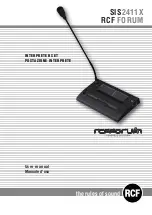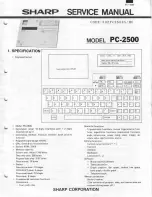
10-192
KDFX Reference
KDFX Algorithm Specifications
948 Band Compress
Stereo algorithm to compress a single frequency band
PAUs:
3
Band Compress
is in most respects identical to
SoftKneeCompress
. However,
Band Compress
compresses only on a single band of frequencies. Frequency band selection is based on a parametric
fi
lter.
You control the
fi
lter center frequency and bandwidth. The compressor controls the
fi
lter gain.
Figure 99
Band Compress filtering at full compression
The compressor reduces the signal level when the signal level exceeds a threshold. The amount of
compression is expressed as a ratio. The compression ratio is the inverse of the slope of the compressor
input/output characteristic. The amount of compression is based on the sum of the magnitudes of the left
and right channels. A compression ratio of
1:1
will have no effect on the signal. An in
fi
nite ratio, will
compress all signal levels above the threshold level to the threshold level (zero slope). For ratios in
between in
fi
nite and
1:1
, increasing the input will increase the output, but by less than it would if there
was no compression. The threshold is expressed as a decibel level relative to digital full-scale (dBFS) where
0 dBFS
is digital full-scale and all other available values are negative.
With
Band Compress
, the side chain processing acts only on a speci
fi
ed band of frequencies. At the input
of the side chain is a bandpass
fi
lter which passes only the frequency band of interest. The side chain
output then controls the gain of a band cut
fi
lter acting on the main signal path. The bandpass and band
cut
fi
lters both are set to the same center frequency and bandwidth which you control. The depth of the
band cut
fi
lter is of course set by the compressor side chain processing.
You can select which channel, left (
L
), right (
R
) or the maximum amplitude of the two (
L & R
) is used to
control the compression (side chain processing) with the SC Input parameter. You can also select which
channel is actually compressed, again left (
L
), right (
R
) or both (
L & R
) using the ComprsChan parameter.
0 dB
- 20
- 40
Freq
10 Hz
100
1000
10 k
Gain
Summary of Contents for K2661
Page 18: ...2 4 LFOs LFO Shapes...
Page 34: ...3 16 DSP Algorithms...
Page 54: ...5 4 MIDI Note Numbers Note Numbers for Percussion Keymaps...
Page 72: ...7 10 System Exclusive Protocol K2661 System Exclusive Implementation...
Page 82: ...9 4 Upgrading Sample Memory Choosing and Installing a SIMM for K2661 Sample Memory...
Page 334: ...10 252 KDFX Reference KDFX Algorithm Specifications...
Page 340: ...11 6 Glossary...
Page 382: ...12 42 Triple Modular Processing Alphanumeric Buttonpad Entries for DSP Functions...
Page 392: ...B 6 SysEx Control of KDFX MSB and LSB...
Page 442: ...D 20 Contemporary ROM Block Objects Controller Assignments Contemporary ROM Block...
Page 490: ...H 12 General MIDI Standard Mode Controller Assignments...
Page 492: ...I 2 Live Mode Objects Live Mode Programs...
Page 498: ...K2661 Musician s Reference Index...
Page 500: ......
















































